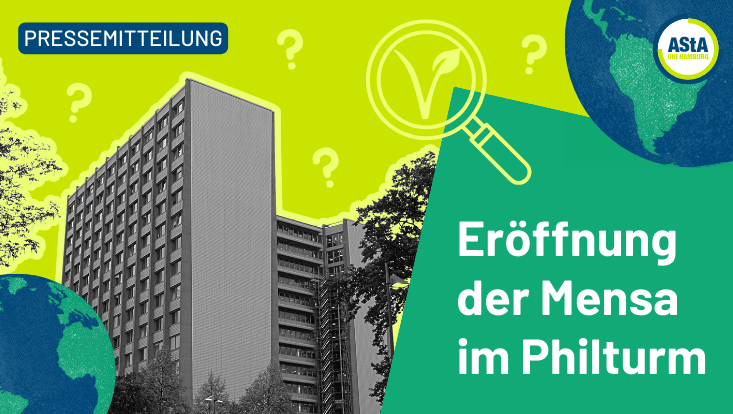The opening of the canteen in the Philturm is an important step for climate protection. Still, the air stays up!
2 April 2024

Photo: Daha Yeo
On April 5, the canteen at the University of Hamburg's Philturm will officially open after a seven-year renovation. The newly opened canteen will only serve one meat dish a day.
The General Students’ Committee (AStA), the Green Office UHH and Students for Future Hamburg see this decision as an important step towards reducing the emissions-intensive courts. However, we would like to stress that this is only a first step.
For over a year, we, the student representatives, have been in talks with the Studierendenwerk (STW) to demand a vegan/vegetarian canteen in the Philturm. Given the climate crisis, an exemplary and climate-friendly diet should be promoted at the university.
The food sector accounts for up to 37% of global greenhouse gas emissions, making it an important lever on the road to climate neutrality. In Germany, animal foods cause about 69% of diet-related emissions, making them significantly more climate-damaging than plant-based foods. The EAT-Lancet Commission report, published in January 2019, shows that it is possible to feed all people on Earth healthily without destroying the planet. But this requires a significant shift in our eating habits.
The reduction to one meat dish per day, as envisaged in the Philturm, is not sufficient by the standards of the Planetary Health Diet. We note that other canteens still serve significantly more meat dishes. That is why we continue to advocate for following Berlin's example and making the menu 96 per cent vegan/vegetarian. We also advocate for climate-friendly dishes to become the most affordable alternatives to ensure that climate action and funding are not mutually exclusive.
In general, canteen prices need to become cheaper and affordable for students. And although many students can no longer afford the canteen, further price increases are looming. The STW currently has to cover a deficit of around €7 million a year. STW Hamburg is one of the worst-funded institutions in Germany per student*r. However, the Department for Science, Research, Equality and Communities has indicated that it will not provide this much-needed funding. We also oppose the STW's decision to remove the possibility of paying cash in the canteens and cafes, as students in financially precarious situations are often dependent on cash, which they receive as tips or financial support from their parents. Other students who do not have an account are also excluded from eating in the canteens.
The opening of the canteen at Philturm marks an important step towards a more sustainable diet, which we as AStA both welcome and critically question. We are confident that joint efforts can help make a positive contribution to protecting our planet. Climate-friendly changes must also go hand in hand with social balance for widespread acceptance.
1 https://www.wwf.de/themen-projekte/landwirtschaft/ernaehrung-konsum/essen-wir-das-klima-auf
2 https://www.bzfe.de/nachhaltiger-konsum/lagern-kochen-essen-teilen/planetary-health-diet/
3 https://www.berliner-zeitung.de/mensch-metropole/veganes-chili-schlaegt-currywurst-der-chef-der-tu-mensa-ueber-24500-mahlzeiten-taeglich-li.2147446
For further information and inquiries, please contact:
Freya Kirmse
Lecturer for sustainability and ecology, AStA University of Hamburg
nachhaltigkeit@asta.uni-hamburg.de
